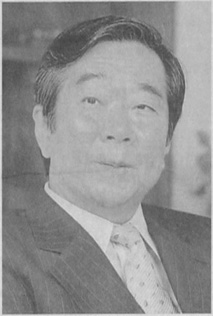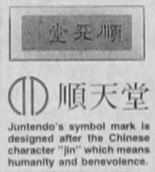About Juntendo
TOPICS -THE JAPAN TIMES (Sat,Dec 25,2004) -
Striving for advances in the 'JIN' spirit

C.E.O.and president,Juntendo University
Juntendo is Japan's oldest school of Western medicine, and is regarded as one of the outstanding general medical institutions in the country.
It began in 1838 as a private school of Dutch medicine founded in the Yagenbori district of Edo (now Tokyo's Minato Ward) by Taizen Sato (1804-1872) .Taizen had studied Dutch medicine in Nagasaki and became one of the best practitioners of Western medicine in the country.
In 1843,Taizen was invited by the lord of the Sakura-han (feudal domain) ,Masayoshi Hotta,to serve as his personal doctor.Taizen then moved the medical school from Edo to Sakura (Chiba Prefecture).
Learning of Taizen's expertise in surgery-at a time when there was a backlash against Western learning in Edo-scientists of Dutch medicine gathered from around the country in Sakura. A story handed down from generation to generation is that the most advanced medicine lay in the forests of Sakura.
In 1875, he established the Juntendo clinic (Iin) in the Yushima district of Tokyo.Takanaka helped lay the foundations of Western medical education in Japan.
Takanaka's adopted son, Susumu Sato (1845-1921) ,who later became the third leadre of Juntendo, studied medicine at the University of Berlin in Germany. He carried the first passport ever issued by the Meiji government and became the first Asian student to formally graduate from a European school of medicine and receive a doctorate.
After returning home, he played a leading role in the disseminaton of German medical science education at the Imperial University of Tokyo as well as at Juntendo. During the Sino-Japanese and Russo-Japanese wars he served as surgeon general.
Juntendo has produced many excellent medical scientists and practitioners in the many years that have passed since its founding , developing into a major medical and health-sports university with a graduate school that has been a pioneer in medicine, medical care and sports-health science.
Juntendo's success can in part be attribute to its embrace of the principle "Incessantly move ahead, "which conveys the belief of Juntendo's founding fathers that education and research activities can flourish only in an environment of free competition.
 Despite its long history, Juntendo has been almost completely free of academic factionalism, with a firmly established custom of singling out successors solely on the basis of ability and merit.
Despite its long history, Juntendo has been almost completely free of academic factionalism, with a firmly established custom of singling out successors solely on the basis of ability and merit.All this is derived from the motto "JIN," meaning humanity or benevolence: "I exist as you exist." Being tender and considerate of others is the spirit of "JIN," which represents the ideal of medicine for all those who gather at Juntendo. Juntendo's badge is designed after the Chinese ideographic character "JIN."
In recent years, the national government has granted Juntendo subsidies to establish centers for the treatment and research of atopic diseases and of conditions related to senility, to set up an environment-medical research institute, and to train international contagion-control experts.
Since its founding in the late Edo Period, Juntendo has been constantly moving ahead, not only actively introducing Western medicine into Japan but also striving to make medical advances.
On the 200th anniversary of Taizen Sato's birthday, I would like to see Juntendo redeliver the founding spirit of "JIN" to Japan and the world.
